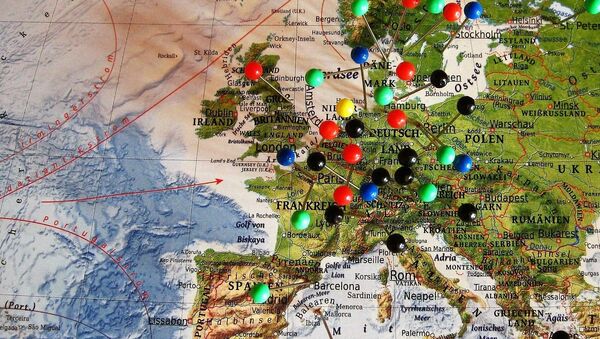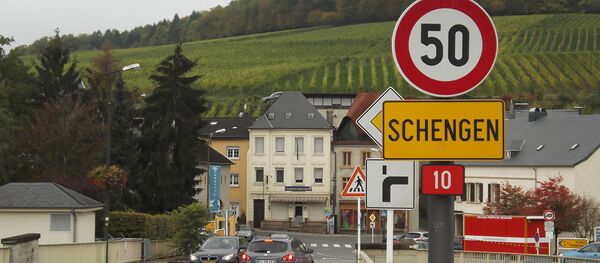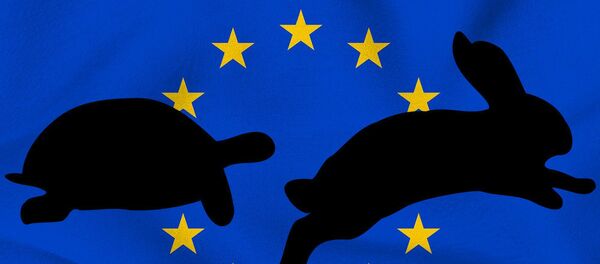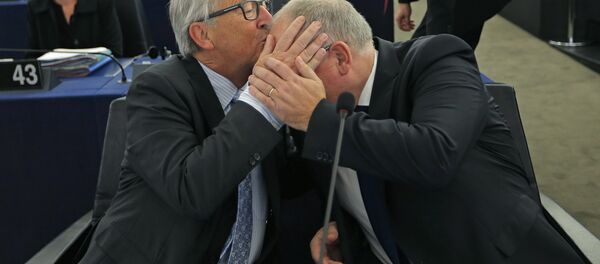Ahead of the anniversary, calls within the EU for a so-called "two-speed Europe" are becoming more vocal. The idea behind the multi-speed EU is that different parts of the European Union should integrate at different levels and paces, depending on the political situation in each individual country.
Sputnik Italy has talked to Italian economist Pasquale Lucio Scandizzo, Professor of Political Economy at the University of Rome Tor Vergata, the president of the OpenEconomics project, about who will gain from such a model.
"The notion of a 'two-speed Europe' has two meanings: on the one hand, it is a statement of the fact that Europe is moving along at two different speeds: at the speed of the Eurozone and at the speed of the rest of Europe. However there is already a 'two-speed' model within the Eurozone itself: there are more developed countries like Germany and the Netherlands and there are countries which are experiencing certain economic hardships – France, Spain, Italy and others," he told Sputnik.
When asked whether there is a risk of that two different Europes will emerge, "Series A" and "Series B" Europe, the economist said that there is not enough experience in the matter.
"We can speculate from the perspective of the free trade treaties which unite different groups of countries. There are so-called 'clubs of countries' which move at different paces and to a certain extent compete with each other," he explained.
"If we compare economic successes with some sort of a football match, then all the countries would prefer to be in Series A and win the championship. However it is impossible," he said.
Pasquale Lucio Scandizzo then explained that to him, the concept of a 'two-speed' Europe seems ambiguous. He further referred to one of the speeches of former president of France Nicolas Sarkozy, where he elaborated that Europe wanted to integrate by forming a certain superstate — Eurozone. It united 27 countries, then 32, 35 and further on. It was only too clear that all the countries are very diverse and it is unthinkable to unite them into a federation. Sarkozy proposed uniting them into a confederation.
However, this idea provoked a negative reaction from countries such as Poland, he further noted.
Commenting on German Chancellor Angela Merkel's recent call for a two-speed EU, the economist suggested that the current system could be replaced by 'clubs of countries', with their own sets of rules, which would all share a common market, which would serve as a so-called 'super-club' where members could operate on an equal footing. Going forward, more alike counties could then unite into closer units.
"I think there should be a multi-speed EU, and that Italy could avoid joining Eurozone, but join some other 'club.' It could be a way out for Italy, as our country is living through a dilemma, tearing apart between the two options: either to abide by the strict rules which were written in favor of other economies, different from that of Italy's, or pursue a more flexible economic and currency policy.
"We need a variable Europe, with numerous unions (clubs) of countries and an opportunity to switch the clubs. This will increase the political and economic efficiency of all the member states. It will be of particular use to those countries which are experiencing difficulties in their economies and don't have free fiscal or monetary policies, namely the Mediterranean countries," he told Sputnik.
However he further concluded that this applies to all the member states of the EU, and that flexible financial and political institutions should become a norm within the EU.







